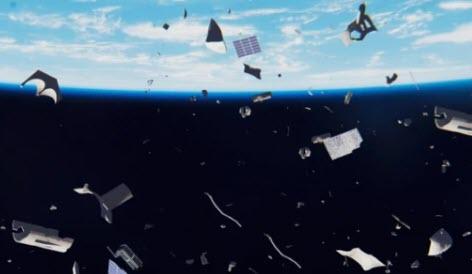Authored by Michael Kern via OilPrice.com,
The space race has begun. Private companies have exploded, soaring beyond multiple billion-dollar valuations seemingly overnight. Some of the hottest tech companies on the planet are already facing off for a piece of the pie. But there’s a looming crisis that, if not addressed, could bring the entire industry crashing down. Literally.
After over 60 years of space exploration, humankind has left a lot of trash behind. Already, hundreds of thousands of pieces of space debris are in orbit. This is a terrifying reality, especially considering just a tiny 1mm object can have a catastrophic effect on a satellite or spacecraft.
Holger Krag, head of the space debris office for the ESA, notes,
“Even today we are losing satellites due to debris and it is only a matter of time before more start colliding. If we continue the way we do, 10 years from now some regions in space will be too risky to visit.”
With companies such as SpaceX, Blue Origin and Virgin Galactic eyeing commercial space flight within the next few years, and even more looking to roll out an array of new private satellites, the space debris risk has never been greater. And if Krag is correct, the more crowded our orbit gets, the more dire the threat will become.
Just last year, space companies raised over $5.8 billion dollars, Virgin Galactic launched its much-anticipated IPO, and pure-space plays spiked in trading interest. Space Angels CEO Chad Anderson sees this number going even higher in 2020, predicting that more companies are gearing up to hit the public markets. Anderson explained,
“These companies are graduating and going from concept to scale,” Anderson said.
“All the companies that are in space in the last 10 years are new. They’ve all entered a different point over that timeline and you need to see them graduate as, in venture capital investing, graduation rates are really important.”
What Is Being Done About Space Debris?
Government organizations are currently taking the lead on the space cleanup initiative, with the U.S. Air Force, NASA and the European Space Agency dedicating sizable budgets to the effort. But some private organizations are looking to contribute, as well.
Take Astroscale, for example. The Japanese firm is already in the construction stages of a space junk removal project, ELSA-d, that it hopes to launch by mid-2020.
ELSA-d will consist of two separate spacecrafts. A 180-kilogram “servicer” spacecraft, and a 20-kilogram “client” spacecraft. The Servicer is equipped with proximity rendezvous technologies and a magnetic docking mechanism, while the Client has a ferromagnetic plate which enables it to be docked with. The Servicer will repeatedly release and dock the Client in a series of technical demonstrations proving the capability to find and dock with debris.
Nobu Okada, the founder and chief executive of Japan-based company Astroscale, explains,
“Cleaning up space is critical,” adding,
“People know about global warming. People know about ocean clean-up. But they don’t know anything about the space debris issue.”
Another private company looking to tackle the problem is D-Orbit. While the Italian startup hasn’t raised the funds that Astroscale has, it is still pushing forward in its ambitious mission to reduce space debris through new innovative technology. While Astroscale is dedicating much of its focus on a single project, D-Orbit is experimenting with a little bit of everything.
D-Orbit’s flagship product is the D3, an “independent, smart motor optimized for decommissioning maneuvers.” The D3 is a preemptive end-of-life solution for satellite manufacturers which is attached to new satellites with the goal of being able to remove them from orbit quickly and safely when they have reached the end of their lifespan.
The company is also actively cutting deals with other startups, including a Swiss startup called Astrocast that has raised about $4.2 million, including from Airbus, to deploy a constellation of 80 cube satellites for the Internet of Things, which could even compete with bigger, more expensive IOT networks like those operated by ORBCOMM.
The Future Of Space Travel
Take one look at any major investment website, and you’re sure to be bombarded with stories about the next big space company on the horizon. Though the billionaires of the bunch often get the most attention, none of their endeavors will be possible if the space debris crisis isn’t addressed.
Matt Ocko, a partner at Data Collective, a San Francisco venture capital firm invested in Rocket Lab, explains, “There needs to be pressure from the space community and governments to monitor these companies.”
And that pressure is sure to come.
Right now, space is still the wild west, but when government regulations start to take root, and the space junk problem becomes a full-blown crisis on the scale of global climate change, early innovators in the debris removal sector could explode.
